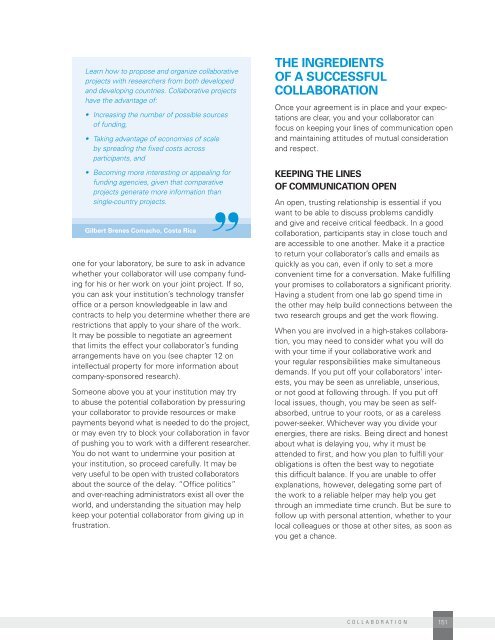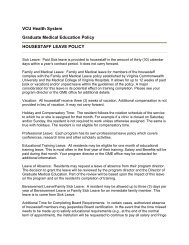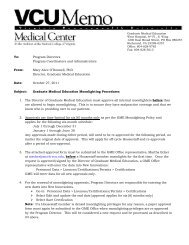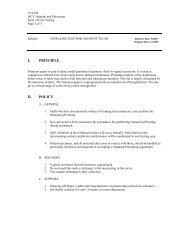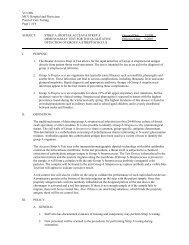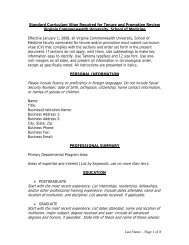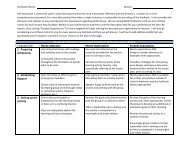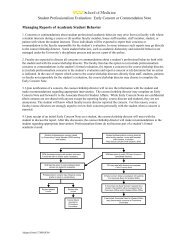n The expected contribution <strong>of</strong> each collaborator.n Financial responsibilities <strong>of</strong> each collaborator.n Milestones.n Reporting obligations to funders or otherstakeholders.n Expectations about authorship.n How and when papers will be written.An explicit plan <strong>of</strong>fers several advantages. Itprevents misunderstandings and it helps keepthe project on track. Furthermore, if you expectto apply together for funding for the project, thisplan can be expanded into a grant proposal. In acollaboration between two academic labs, thecollaboration agreement can simply be emailedback and forth until both parties are satisfied.Obtaining signatures could seem overly formal,but it is very important that on both sides allkey participants explicitly signal that you haveconcluded these negotiations and have reacheda clear agreement.Using a Formal Agreement. A formal, legallybinding written agreement is probably necessaryif the collaboration involves a commercial entitysuch as a pharmaceutical company, or if you areworking toward a commercial application in whicha patent is an expected outcome (Chapter 12 willdiscuss patents). For collaborations that do notinvolve a commercial entity, a general Letter <strong>of</strong>Agreement or Letter <strong>of</strong> Intent spelling out theinterest in collaboration between institutions canprovide a framework for a range <strong>of</strong> collaborativeactivities. Written and agreed-upon work plans forspecific activities or projects developed togethercan then provide the explicit terms <strong>of</strong> the collaboration.Even if it is not intended to be a legallybinding document, you and your collaboratorwill want to consult with appropriate <strong>of</strong>fices atyour respective institutions to help you draft thisagreement. It can be very useful to have someonewho has not been part <strong>of</strong> your discussions readwhat you have written down, because you may beso accustomed to your own assumptions that youwill have neglected to write them down.Collaborations that involve provision <strong>of</strong> materialssuch as biological samples such as DNA, microbialisolates, genetically modified organisms or reagentsdeveloped by you or your research team mayinclude a “Materials Transfer Agreement.” Thisdocument is to be signed by the recipient, indicatingthe material provided, the purpose for whichthe material will be used, the conditions underwhich the material was provided and instructionsfor acknowledgement <strong>of</strong> the contribution andrestriction <strong>of</strong> distribution to others.If your institution does not have an <strong>of</strong>fice thathelps make this kind <strong>of</strong> agreement, you shouldmake sure you have the power to promise thethings you have promised, or have someoneat your institution who does have the power topromise get involved. In a large institution, thismay be a technology transfer <strong>of</strong>fice, and their staffmay also arrange for legal review by the institution’sattorneys. In an institution without such an<strong>of</strong>fice, you should find people with appropriateauthority to review and sign the proposed contract.Look for other researchers who have made suchagreements, and discuss the restrictions withlegally trained people in your own country. Itmay be that there are not yet laws within yourcountry related to this kind <strong>of</strong> agreement, butsomeone with legal training can at least help alertyou to language in the proposed documents thatseems to commit you to more than you wouldlike. Negotiations are expected in these kinds <strong>of</strong>agreements—the most important thing is thatyou know what rights you may be signing away,and that you do not release more <strong>of</strong> your (or yourinstitution’s, or your country’s) rights than youmean to or have the authority to.Make sure that such documents spell out the timeperiod <strong>of</strong> the collaboration or provide a mechanismby which you can terminate your involvement.Be aware that if your collaborator has financialsupport from a company for his or her share <strong>of</strong>the work, that funding agreement may containrestrictions that apply to the collaborative project.For example, the company may have the right todelay publication and to license the results <strong>of</strong> thecollaboration. If the collaboration is an important150 excellence everywhere
Learn how to propose and organize collaborativeprojects with researchers from both developedand developing countries. Collaborative projectshave the advantage <strong>of</strong>:• Increasing the number <strong>of</strong> possible sources<strong>of</strong> funding,• Taking advantage <strong>of</strong> economies <strong>of</strong> scaleby spreading the fixed costs acrossparticipants, and• Becoming more interesting or appealing forfunding agencies, given that comparativeprojects generate more information thansingle-country projects.”Gilbert Brenes Comacho, Costa Ricaone for your laboratory, be sure to ask in advancewhether your collaborator will use company fundingfor his or her work on your joint project. If so,you can ask your institution’s technology transfer<strong>of</strong>fice or a person knowledgeable in law andcontracts to help you determine whether there arerestrictions that apply to your share <strong>of</strong> the work.It may be possible to negotiate an agreementthat limits the effect your collaborator’s fundingarrangements have on you (see chapter 12 onintellectual property for more information aboutcompany-sponsored research).Someone above you at your institution may tryto abuse the potential collaboration by pressuringyour collaborator to provide resources or makepayments beyond what is needed to do the project,or may even try to block your collaboration in favor<strong>of</strong> pushing you to work with a different researcher.You do not want to undermine your position atyour institution, so proceed carefully. It may bevery useful to be open with trusted collaboratorsabout the source <strong>of</strong> the delay. “Office politics”and over-reaching administrators exist all over theworld, and understanding the situation may helpkeep your potential collaborator from giving up infrustration.THE INGREDIENTSOF A SUCCESSFULCOLLABORATIONOnce your agreement is in place and your expectationsare clear, you and your collaborator canfocus on keeping your lines <strong>of</strong> communication openand maintaining attitudes <strong>of</strong> mutual considerationand respect.Keeping the Lines<strong>of</strong> Communication OpenAn open, trusting relationship is essential if youwant to be able to discuss problems candidlyand give and receive critical feedback. In a goodcollaboration, participants stay in close touch andare accessible to one another. Make it a practiceto return your collaborator’s calls and emails asquickly as you can, even if only to set a moreconvenient time for a conversation. Make fulfillingyour promises to collaborators a significant priority.Having a student from one lab go spend time inthe other may help build connections between thetwo research groups and get the work flowing.When you are involved in a high-stakes collaboration,you may need to consider what you will dowith your time if your collaborative work andyour regular responsibilities make simultaneousdemands. If you put <strong>of</strong>f your collaborators’ interests,you may be seen as unreliable, unserious,or not good at following through. If you put <strong>of</strong>flocal issues, though, you may be seen as selfabsorbed,untrue to your roots, or as a carelesspower-seeker. Whichever way you divide yourenergies, there are risks. Being direct and honestabout what is delaying you, why it must beattended to first, and how you plan to fulfill yourobligations is <strong>of</strong>ten the best way to negotiatethis difficult balance. If you are unable to <strong>of</strong>ferexplanations, however, delegating some part <strong>of</strong>the work to a reliable helper may help you getthrough an immediate time crunch. But be sure t<strong>of</strong>ollow up with personal attention, whether to yourlocal colleagues or those at other sites, as soon asyou get a chance.collaboration151
- Page 3 and 4:
A R e s o u r c e f o r S c i e n t
- Page 5 and 6:
Table of ContentsVII119PrefaceChapt
- Page 7:
135 Chapter 10E x p a n d i n g Y o
- Page 15 and 16:
Q u e s t i o nq&aWhat Is a “Tenu
- Page 17:
preparing for immediate submission,
- Page 22 and 23:
Practicing the Talkn Practice your
- Page 24 and 25:
your one-on-one interviews you have
- Page 26 and 27:
If talking directly about money is
- Page 28 and 29:
When the institution responds and y
- Page 30 and 31:
equipment and supplies. Maintenance
- Page 32 and 33:
Q u e s t i o nq&aIs your instituti
- Page 34 and 35:
Working With Human SubjectsWhether
- Page 36 and 37:
RESPONSIBILITIES BEYONDTHE LABORATO
- Page 38 and 39:
UNDERSTANDING YOURINSTITUTION AND H
- Page 40:
Criteria for PromotionStructure of
- Page 45 and 46:
Q u e s t i o nWhat’s in a Name?q
- Page 47 and 48:
Screening ApplicantsWhen you review
- Page 50 and 51:
Interpersonal Skillsn How important
- Page 52 and 53:
Multinational Organizations are hir
- Page 54 and 55:
n If there is an office that handle
- Page 57 and 58:
n Seek funding and publish papers (
- Page 59 and 60:
In fact, even though you yourself h
- Page 61 and 62:
n Craft a statement that you feel c
- Page 63 and 64:
n When you delegate authority to so
- Page 65 and 66:
n Use only pens, preferably with wa
- Page 67 and 68:
Strategy sessionsShould you decide
- Page 69 and 70:
Finding Good Papers for Journal Clu
- Page 71 and 72:
If possible, invite people in your
- Page 73 and 74:
Q u e s t i o nq&aHow do I avoid po
- Page 75 and 76:
The International Committee of Medi
- Page 77 and 78:
Managing Conflictin the LabConflict
- Page 79 and 80:
steps for dealing with conflictWhen
- Page 81 and 82:
chapter 5managing your time“ Succ
- Page 83 and 84:
Check your work: the 90-year though
- Page 85 and 86:
n Make and keep appointments with y
- Page 87 and 88:
n Help them seek advice without tak
- Page 89 and 90:
FAMILY MATTERSMany scientists face
- Page 91 and 92:
chapter 6project management“ We m
- Page 93 and 94:
My project is to get a grant funded
- Page 95:
ObjectivesObjectives are the end re
- Page 98 and 99:
The key events schedule and the act
- Page 100 and 101:
Microsoft Project, a program that s
- Page 102 and 103:
Martin, Vivien. Managing Projects i
- Page 104 and 105:
appendix II: Example of a Work Brea
- Page 106 and 107:
appendix iv: Example of a Gantt Cha
- Page 108 and 109:
e h i n d c l o s e d d o o r s :w
- Page 110 and 111: Who might be interested in supporti
- Page 112 and 113: Call your program officerProgram of
- Page 114 and 115: direct costs vs. indirect costsDire
- Page 116 and 117: RESOURCESAllen, Ernest M. “Why ar
- Page 118 and 119: the next generation of students (th
- Page 120 and 121: Seek Feedback through a Formal Peer
- Page 122 and 123: Encouraging Student Questionsn Do n
- Page 124 and 125: Here are some ways you can help the
- Page 126 and 127: n Are there curriculum changes unde
- Page 128 and 129: a relaxed format for talking about
- Page 130 and 131: spend in preparing an effective cou
- Page 132 and 133: The Publishing ProcessTypes of Jour
- Page 134 and 135: A word about impact factorsThe impa
- Page 136 and 137: C r e a t i n g a n i n t e g r a t
- Page 138 and 139: may need to take the first author p
- Page 140 and 141: submitting image filesToday, most i
- Page 142 and 143: Submitting your Paper to Another Jo
- Page 144 and 145: RESOURCESDavis, Martha. Scientific
- Page 146 and 147: increase your impact as a scientist
- Page 148 and 149: Q u e s t i o nq&aHow do I communic
- Page 150 and 151: n Offer criticism and correction in
- Page 152 and 153: It is important to discuss career g
- Page 154 and 155: When Mentoring,Advisory, or Supervi
- Page 156 and 157: For researchers in developing count
- Page 158 and 159: n Is travel safe and convenient, or
- Page 162 and 163: Meetings. Set up systems to ensure
- Page 164 and 165: SPECIAL CHALLENGESFOR THE BEGINNING
- Page 166 and 167: e an important connection to future
- Page 168 and 169: The invention of a new method or pr
- Page 170 and 171: licensee, who can charge others for
- Page 172 and 173: Most profound for developing countr
- Page 174 and 175: Finally, the patents have been chal
- Page 176 and 177: And, India benefited as a supplier
- Page 178 and 179: paperwork involved in purchasing1.
- Page 180 and 181: labeling mattersA case in point: In
- Page 182 and 183: equipment, freeze-drying equipment,
- Page 184 and 185: Responsibilityfor materialsIf an or
- Page 186 and 187: Recent Improvementsin Materials Tra
- Page 188 and 189: “Knowledge is power.” —Sir Fr
- Page 190 and 191: MOUMemorandum of UnderstandingRFPRe
- Page 192 and 193: notes continued182 excellence every
- Page 194: notes continued184 excellence every


